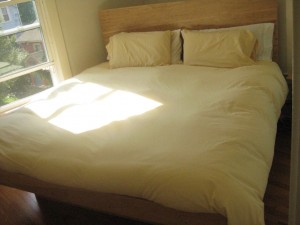I have a history of sleep issues. To give you an example of how light a sleeper I used to be my husband didn’t see me physically asleep for the first two years we slept next to each other. Acupuncture, yoga, mindfulness and a lot of sleep hygiene training have changed all of that.
If a person sleeps 8 hours a night, they spend 56 hours a week in bed, 2,920 hours asleep in a year and a massive 233,600 hours (or 9,733 days) asleep in their lifetime. We do a ton of stuff while we sleep. The discs of the spine absorb fluid while we sleep creating the cushion that allows for greater skeletal mobility. Our heart rate and respiratory rates slow down improving the strength and health of the heart. Sleep clears the mind, allows the immune system to restore health in the body, and allows the muscles and bones to be without the body’s weight and our habitual postures. Read 11 more fun benefits of sleep here.
Qualities of Good Sleep
Good hours (preferably 10pm-6am): It isn’t just about getting 8 hours, in Chinese Medicine the hours between dinner time and dawn are the yin hours. Yin is slower, cooler, quieter than the yang. If you sleep past dawn into the yang period of the day your sleep is less restorative and more active. If you are awake during the yin time you deplete the fluids of the body and add more heat to the system making it harder to sleep the next night.
Steady sleep: So many patients tell me they get eight solid hours of sleep every night. Then they reveal they wake two times to urinate. Then they say that they have a lot of dreams. Then they say they roll over every 30 minutes. It isn’t surprising at all when they admit they never wake rested. Good sleep is deep and thorough. You should roll over once or twice a night, not every half hour. You shouldn’t really dream at all and if you do, you shouldn’t be able to remember it. Dreams are a sign of active sleep, not deep, restorative sleep.
No night urination: This one is hard. Western Medicine tells us that as we age, especially men, it is inevitable that there will be an increase in frequency of night urination. Don’t believe it. I’ve treated a lot of men over the age of 60 who sleep all night long. It is possible and worth working towards with diet changes, better hydration, weight loss and acupuncture.
Steps Towards Proper Sleep Hygiene
- Keep the lights low in the house after dinner
- Stay hydrated all day long and keep drinking until you go to bed (dehydration can cause insomnia and night urination)
- Keep your bedroom dark and quiet
- The bedroom should be used for sleep and lovemaking, nothing else
- Don’t keep work-related or stress-causing objects in the bedroom
- Turn the clock away from you or use one that doesn’t glow at night
- Avoid exercise after dinner or do a restful activity after exercise before bed
- Have a bedtime routine, just like you did as a child
- Sleep with a glass of water by the bed and drink if you wake thirsty
- Pay attention to sleep windows, do boring things after dinner and allow the body to tell you when it is tired, go to bed when you feel tired
- There are four hour cycles of sleep, if you miss the 10pm cycle you might not even feel tired again until 2am.
- Once in bed think about Sivasana, go through the steps of relaxing and quieting the physical body and allow sleep to come
- If you wake at any point in the night and can’t get back to sleep stay in bed and keep your eyes closed. You allow the nervous system to rest and recharge even if you are not
- Yes, try to avoid eating a big meal directly before bed, but don’t go to bed hungry either (low blood sugar can cause insomnia as well)
 This summer we bought a new mattress at Fly by Night and built a bed for it out of beautiful, but inexpensive, maple plywood. The first night we slept in our new bed we slept right through until 8:30 in the morning and woke up giddy because we hadn’t slept that late or that well in years. A good night’s sleep is worth all the money in the world. Isn’t it time to think about how you prioritize sleep?
This summer we bought a new mattress at Fly by Night and built a bed for it out of beautiful, but inexpensive, maple plywood. The first night we slept in our new bed we slept right through until 8:30 in the morning and woke up giddy because we hadn’t slept that late or that well in years. A good night’s sleep is worth all the money in the world. Isn’t it time to think about how you prioritize sleep?
Pingback: Frustration/Stress: Emotions Post #4 – Window of Heaven Acupuncture & Yoga
Pingback: Nourish The Yin: Embrace The Feminine, The Stillness, The Quiet – Window of Heaven Acupuncture & Yoga